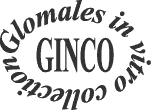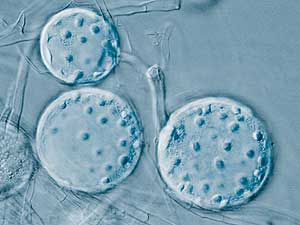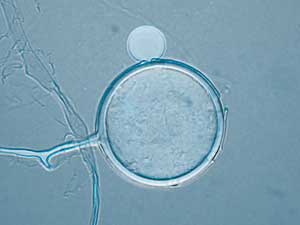
Edition 10 - December, 2001
 Edition 10 - December, 2001 |
GINCO: a Glomales in vitro collection |
“The study of arbuscular mycorrhizal fungi (AMF) and the AM symbiosis formed with host plants is complicated by the obligate biotrophic status and subterranean nature of the mycobionts involved” (Fortin et al., In press). To overcome this, several attempts have been made over the last 25 years to culture these organisms in vitro. This has led recently to the development of the first international collection of in vitro cultured AMF species, GINCO, which is hosted jointly at BCCM/MUCL and ECORC in charge of CCFC.

|
 Cluster of spores of Glomus proliferum Dalpé and Declerck (MUCL 41827 – DAOM 226389) containing several hundreds of individuals. |
 Mature spores of an unidentified Glomus species. |
 Mature spore of Glomus intraradices Schenck and Smith (MUCL 43194 – DAOM 213198). |
History – Since the pioneering seventies, when Mosse and Hepper (1975)
established in vitro mycorrhiza with Glomus mosseae, at least 27 AMF species
have been successfully cultured monoxenically in association with RI T-DNA
transformed or non-transformed excised host roots (Fortin et al., In press).
These species belong to 5 genera within the 3 Glomales families (Glomaceae,
Acaulosporaceae, and Gigasporaceae). With few exceptions, most of these species
as well as unidentified strains have been maintained over several successive
generations by means of sub-culturing (Strullu et al., 1997; Declerck et al.,
1996, Declerck et al., 1998).
The increase in the number of AMF species,
mostly over the last decade, the achievement of their long-term maintenance
through continuous culture and/or cryopreservation (Declerck et al., 2000), and
the growing demand of the scientific community for germ-free inoculum have led
to the development of the first international collection of AMF exclusively
cultured in vitro: GINCO (Glomales IN vitro COllection – www sites: for Belgium
http://www.mbla.ucl.ac.be/ginco-bel
and for Canada http://res2.agr.ca/ecorc/ginco-can/). This
culture collection grew out of close scientific collaboration between the
Mycothèque de l’Université catholique de Louvain (BCCM/MUCL, Belgium) and the
Eastern Cereal and Oilseed Research Centre (ECORC, Agriculture and Agri-Food
Canada), which is responsible for the Canadian Collection of Fungal Cultures
(CCFC/DAOM, Canada). GINCO is jointly hosted by these two national
collections.
It is the brainchild of Dr Stéphane Declerck (BCCM/MUCL,
Belgium) and Dr Yolande Dalpé (ECORC, Canada). The supporting research teams
have a great deal of experience in isolation, cultivation, propagation and
conservation of in vitro produced AMF.
The purpose of GINCO is to provide the scientific community with
high-quality, contaminant-free AMF inoculum. To achieve an efficient supply of
strains, the fungal material is subjected to continuous quality control and the
number of strains available is being increased. Additional services such as
depositing (for public access, safe deposit and patent deposit),
characterization, and preservation of strains are also offered on request. In
collaboration with a panel of international experts in biochemistry,
biotechnology, systematic, physiology and ecology, it supports a discussion
forum and a worldwide network of collaborative research and offers specialized
training.
The cultures maintained in GINCO are propagated on synthetic media together with transformed carrot roots (see Declerck et al., 1998). More than 40 AMF strains (Figures 1-3) consisting of at least twelve species and four genera (Glomus, Gigaspora, Scutellospora and Acaulospora) are maintained in GINCO, and 4 of them (G. proliferum, G. intraradices, G. lamellosum and G. cerebriforme) presently available to the scientific community for research purposes. The GINCO strain diversity is being gradually increased. The strains are distributed in vials containing spores embedded in the growth medium sufficient to permit the initiation of 3 to 5 new in vitro cultures. They may also be used in pot-culture propagation.
GINCO guarantees (1) the reliability of the cultures (contaminant-free throughout the life cycle), the monospecificity of the inoculum (no cross-contamination with other Glomales throughout the life cycle), (3) the viability of the spores (high germination rate), (4) the infectivity of the inoculum either in vitro and in vivo, and (5) the effectiveness of the inoculum.
Contact
Dr. Stéphane Declerck
Tel.: +32 (0)10 47 46 44
Fax: +32 (0)10 45 15 01
E-mail: declerck@mbla.ucl.ac.be
Home |
Contents Edition 10 -December, 2001 |
Next Article Edition 10 - December, 2001 |